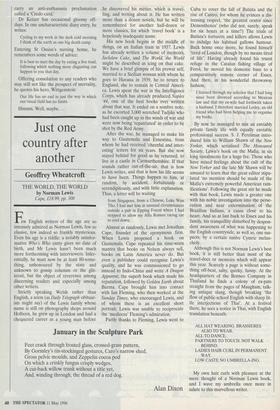Just one country after another
Geoffrey Wheatcroft
THE WORLD, THE WORLD by Norman Lewis Cape, f18.99, pp. 300 Few English writers of the age are so intensely admired as Norman Lewis, few so elusive, few indeed so frankly mysterious. Even his age is a riddle: a notably uninfor- mative Who's Who entry gives no date of birth, and Mr Lewis hasn't been much more forthcoming with interviewers. Infer- entially, he must now be at least 80-some- thing, unhonoured by the state and unknown to gossip columns or the glit- terati, but the object of reverence among discerning readers and especially among other writers.
Strictly speaking Welsh rather than English, a scion (as Daily Telegraph obituar- ists might say) of the Lewis family whose name is still on photography shops around Holborn, he grew up in London and had a chequered career as a young man before . he discovered his métier, which is travel- ling, and writing about it. He has written more than a dozen novels, but he will be remembered for another half-dozen or more classics, for which 'travel book' is a hopelessly inadequate name.
His new book begins in the middle of things, on an Italian train in 1937. Lewis has already written a volume of memoirs, Jackdaw Cake, and The World, the World might be described as icing on that cake. We have a brief glimpse of his prewar self, married to a Sicilian woman with whom he goes to Havana in 1939, he to return to England, she to remain in Central Ameri- ca. Lewis spent the war in the Intelligence Corps, which has already produced Naples '44, one of the best books ever written about that war. It ended on a sombre note, as he escorted 3,000 wretched Tadjiks who had been caught up in the winds of war and were now being 'repatriated' in order to be shot by the Red Army.
After the war, he managed to make his way to Guatemala and Emestina, from whom he had received 'cheerful and inter- esting' letters for six years. But she now stayed behind for good as he returned, to live in a castle in Carmarthenshire. If that sounds rather out-of-the-air, that is how Lewis writes, and that is how his life seems to have been. Things happen to him, at random, by accident, fortuitously or serendipitously, and with little explanation. Thus, a letter will be waiting
from Singapore, from a Chinese, Loke Wan Tho. I had met him in unusual circumstances outside a pub in Epping Forest where I had stopped to allow my Alfa Romeo racing car to cool down.
Almost as randomly, Lewis met Jonathan Cape, founder of the eponymous firm. When Lewis proposed a book on Guatemala, Cape repeated his time-worn mantra that books on Nelson always sell, books on Latin America never do. But even a publisher could recognise Lewis's quality, and he was commissioned to go instead to Indo-China and write A Dragon Apparent, the superb book which made his reputation, followed by Golden Earth about Burma. Cape brought him into contact with Ian Fleming, who then worked at the Sunday Times, who encouraged Lewis, and of whom there is an excellent short portrait; Lewis was unable to reciprocate the 'mediocre' Fleming's admiration.
Partly thanks to Fleming, Lewis went to Cuba to cover the fall of Batista and the rise of Castro, for whom he evinces a dis- tressing respect, 'the greatest orator since Demosthenes' (who did not, surely, speak for six hours at a time?) The trials of Batista's torturers and killers allows Lewis to indulge his habitual gallows humour. Back home once more, he found himself `tired of London, though by no means tired of life'. Having already found his truest refuge in the Catalan fishing village of Ferol, he moved his domestic base to a comparatively remote corner of Essex. And then, in his wonderful throwaway fashion,
I learned through my solicitor that I had long since been divorced according to Mexican law and that my ex-wife had forthwith taken a husband. I therefore married Lesley, an old friend who had been helping me to organise my books.
By now he managed to mix an enviably private family life with equally enviable professional success. S. J. Perelman intro- duced him to William Shawn of the New Yorker, which serialised The Honoured Society, Lewis's book on the Mafia, in six long instalments for a huge fee. Those who have mixed feelings about the cult of the New Yorker and the late Mr Shawn will be amused to learn that the great editor stipu- lated 'no mention should be made of the Mafia's extremely powerful American ram- ifications'. Following the great stir he made with that book, Lewis made a greater one with his noble investigation into the perse- cution and near extermination of the Brazilian Indians, a cause close to his heart. And so at last back to Essex and his family, his tranquillity disturbed by despon- dent awareness of what was happening to the English countryside, as well as, one sus- pects, by a certain native Cymric melan- choly.
Although this is not Norman Lewis's best book, it is still better than most of the travel-docs or memoirs which will appear this year. Scarcely a page is without some- thing off-beat, salty, quirky, funny. At the headquarters of the Borneo Company in Thailand he finds a colony of ex-pats straight from the pages of Maugham, talk- ing antique slang, though breaking 'the flow of public-school English with sharp lit- tle interjections of Thai'. At a festival there, he sees a notice in Thai, with English translation beneath:


































































 Previous page
Previous page